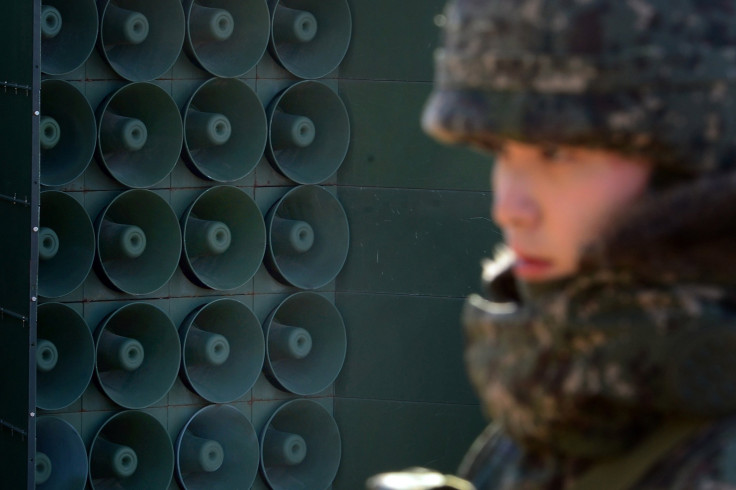South Korea Gives North Koreans News About Defecting Solider Through DMZ Announcements

South Korea broadcasted the news of a soldier defecting to the country from North Korea earlier this month through its military’s loudspeakers at the Demilitarized Zone (DMZ), a report said Sunday.
According to South Korea ’ s Yonhap News, the updates about the soldier, identified only by his surname, Oh, were broadcast shortly after the defection on Nov. 13. It was targeted towards North Korean servicemen and, according to officials cited by the news agency, the information featured details including how he defected and treated in South Korea.
Reuters quoted John Cook-Jong Lee, the lead surgeon on Oh ’ s case saying: “He’s a pretty nice guy.” “He told me that he is so thankful for South Koreans for saving his life and giving him that much blood,” Lee is also reported to have said.
It also talked about how the North fired at Oh and violated the Korean War Armistice in a manner that seemed like it was taunting the North. On Sunday, the broadcast took a swipe at North Korean Army ’ s bad health conditions, talking about the "nutritive conditions" of Oh. "The nutritive conditions of the North Korean soldier who recently defected through the Panmunjom were unveiled, ” it said, Yonhap stated. The broadcasts were reportedly so loud that people within 12.4 miles (19.9 kilometers) from the DMZ are able to hear it.
The defected soldier—who is now reportedly recovering after undergoing surgery for the bullet wounds—was also found to have an “enormous number” of parasites in his body, including an 11-inch long roundworm living in his digestive tract.
“In my over-20-year-long career as a surgeon, I have only seen something like this in a textbook,” Lee told The Guardian .
According to Yonhap, the speakers that broadcasted from the DMZ were part of an operation that aimed at giving news to country ’ s soldiers and border residents and is considered to be psychological warfare.
The purpose of the speakers, the BBC stated, was to persuade North Korean soldiers to doubt their own regime or even defect. South Korea stopped the broadcast for a while after it was protested by the North, fearing defections. However, it was restarted in 2016 after Pyongyang test-fired a nuclear bomb. Last year, the speakers on the South Korean side blasted North Korea with loud-volume pop music broadcasts as a part of the propaganda war.
The apparent taunts by the South on Sunday also reflected dire health conditions of those in North Korea. According to a Washington Post report following the recent defection, the country faced a health and humanitarian crisis. Meanwhile, a United Nations report from March found that roughly 18 million people in North Korea were not getting enough food.
News.com.au reported that despite millions of citizens suffering blackouts and a lack of adequate food, the country spent more than 20 percent of its annual GDP on the military. The New York Times said others who defected to the South had also cited the existence of parasites and lack of nutrition.
© Copyright IBTimes 2024. All rights reserved.





















